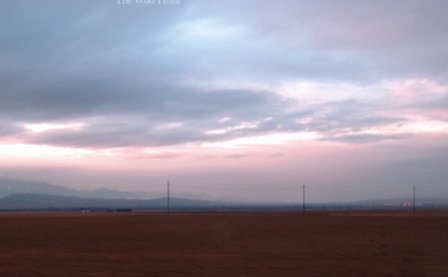At this rate, Kristian Matsson will likely go electric in 2014, turn to country in 2017, discover gospel in 2027, and unplug again sometime in 2039. And if he’s really serious about the whole Dylan thing, he will crash his motorcycle in 2015, get a divorce in 2025, convert to Christianity in 2027, and contract a lung fungus in 2042. As a musician, he’ll never live up to his inspiration. As a performance artist, though, he might just pull off something truly rich and strange.
Matsson, of course, makes no bones about his Dylan crush, but he stubbornly refuses to follow Dylan’s most significant piece of advice. Where Dylan says, “Don’t Look Back,” Matsson insists, “There’s No Leaving Now.” His new album falls right into place, somewhere between the earnest fingerpicking folk of Dylan’s first three albums and the full-on electric blues blitz of the mid-60s masterpieces. It could easily have been titled Another Side of Kristian Matsson, since there’s not a single move on it that doesn’t have its counterpart in Dylan’s earlier culture-shaking shift. These songs stretch out easily, if darkly, beyond the tight folk formula, replacing the intensity and commitment of his earlier efforts with moody introspection and weary alienation. Borrowing loosely from country and blues, backed by tentative electric riffs and hooks, and veiled everywhere in cryptic imagery and symbolic non-sense, these songs come across as the first few steps into a new surreal terrain; here, again, we see the folk hero about to turn his back on the folk to explore — via sound and symbolism — his own mysterious back pages. As Matsson sings on the final track, a Spanish-tinged ode to Dylan-esque ennui, “The tired motion of the rusty bell/ Just humming visitor, I quit, go to Hell/ I’ve been to the tower but now walk alone/ There must be marks on every page/ From the past to these songs.”
It’s not a question of whether or not Matsson is any good. His fingerpicking sparkles, his voice is full of charm, and, as a whole, his album will recapture your attention just when you think you’re bored enough to switch to something else. But, at this point, with three albums in and no signs of changing track, you can’t help but wonder if this kind of music represents a viable idiom anymore. Can an updated folk formula really make sense of our world today? Does this style provide an effective way of relating to our own cultural moment? Dylan’s impact was all in his style. Even in the early years, he was as much aligned with pop icons like Elvis and Brando as with folk singers like Guthrie and Seeger. His songs provided a new repertoire of gestures and moves that came to stand in for a certain attitude, a way of inhabiting the world in a specific moment in time. But except as a form of nostalgia or romantic alienation, those moves just don’t work anymore. The second coming of Bob Dylan will not sound like Bob Dylan. For anyone to have the same cultural impact, they would have to be somewhat miraculously situated within the white-hot dynamo of history itself, completely in tune with the cultural moment and yet one weird step ahead.
But forget Dylan and his myth. This same impact is demonstrated everywhere today in music, popular or otherwise, in ways that are much more open, much less mythic, less totalizing than in Dylan’s time. Dylan didn’t invent the dialectic of art and history; he merely dwelled in it for a brief glorious while, showing everyone how it worked. Fifty years later, Matsson’s reverence for this moment seems merely suffocating and ultimately defeatist. Sure, he’s not simply aping at Dylan, and his reverence is more charming than cloying. The new album also bears the influence of Nick Drake, Bruce Springsteen, and, at its country best, Townes Van Zandt, and, in the end, still manages to convey something like Matsson’s own unique tone and vision. Still, even at its most innovative and most direct, his music is shadowed by failure and bafflement, a nagging sense that he’s on the wrong track and doesn’t know how to get off again. The effects can be felt throughout the album, in the vagueness of its themes and the confusion of its lyricism. “Your fear of the leading light,” goes one characteristically mangled verse, “If they are with you and your heart won’t fall/ To see through a fearless eye/ And know that danger finally goes away/ Still you’re trying/ But there’s no leaving now.” In a way, it’s sentiments like these — a sense of belatedness, of almost-ing it, and ultimate resignation — that give Matsson’s album its very small timeliness. The best songs on There’s No Leaving Now still only seem to acknowledge that they’re stuck in the same old ruts, pointing — in their very painful limitations — towards all they fail to name or accomplish in the present day.
Still, I can’t shake this album, even though I very much want to shake it. Matsson is simply too good at what he does to write him off as a Dylan clone. The opening track, “To Just Grow Away,” leads with a sweetly sliding riff, reminiscent of Dylan’s “Corrina, Corrina,” but its bouncy rhythm and rich melodic line quickly establish its own gorgeously wistful mood. “1904” is a genuine earth-shaker; while reminiscent of Dylan’s long-form work on Blonde on Blonde, its various parts — the propulsive strum, a few high-necked riffs, and Matsson’s nasal vocals — come together to create a truly original ode to changing times. Most impressively, Matsson proves here to have mastered the art of the refrain. The album’s tracklist is built off a set of evocative phrases — “it’s just roses dying too young,” “it’s only what these kids will haul around,” “if he could lose these miles.” These sweet phrases — vague enough and used with great restraint — will stick to your soul for days. Together, they suggest a thematic concern with “lost youth” — both the temporal phenomenon of aging and the actual experience of being young and confused. “Why are you drinking again, Little Brother,” Matsson sings on what seems like the album’s most direct track, “when your rambling’s the hard part of loving you?” On moments like these, gently mixed with an ear to the mono recordings of the past, you just can’t resist the album’s tender mix of nostalgia, compassion, and helplessness.
And yet what do you do with an album that presses all the right buttons and still fails to be interesting? Lacking any substantial vision or purpose, There’s No Leaving Now comes across less like “equipment for living” and more like a bunch of post-folk gibberish. Even at his most cryptic, Dylan always seemed to be hinting at mysteries and wonders just around the corner. He couched his riddles in a language that easily linked up with both the anxious everyday experiences of postmodernity and the larger ontological questions that plague its philosophy. Matsson’s folk, on the other hand, emerges after years of indie self-absorption and political minimalism; at best, his music alludes to a rather tedious set of personal problems and, at worse, comes across like a lot of hippie/hipster mumbo-jumbo. Ultimately, the album’s obscurity proves more frustrating than alluring. Mattson’s lyrics, with their intentionally broken syntax and jarring shifts in diction, only mask at a passion and wisdom that he just hasn’t earned yet. In this regard, “Criminals” is perhaps the greatest letdown of all. Here, Matsson tries to tap into the ragtag kitchen-sink democracy of Dylan’s “Desolation Row.” “Come see the strain of a reeling tribe,” he sings, “Come meet the criminals, this Napoleon ride.” Backed by a nifty little ramble on the electric guitar, Matsson yelps and warbles his way through the song just like his idol, but fails to conjure anything like Dylan’s freaky collective or even a reason for joining in. In a way, Matsson seems to be rushing through the song, reeling off vague lines about broken mirrors, the miracles of gulls, and “straights and lines and every sort of options,” as if he himself doesn’t seem to believe any of it. As a listener, you’ll likely get stuck way back on the first line, and then maybe skip ahead to the third, or perhaps the fifth, and then you’ll realize that Matsson’s already on the third verse, and you’ll try to figure out if it means anything at all, but the riddles keep piling up, and, by the time he hits the solo, which sounds like a cracked organ from a crazy kiddie fair, you might find yourself thinking that some riddles are just not interesting enough to solve.
More about: The Tallest Man On Earth



